New evacuation warning issued as threat persists
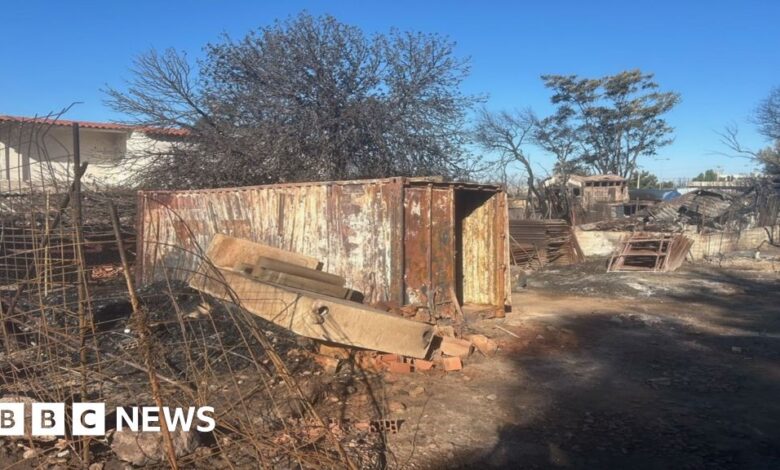
A new evacuation warning for the Greek coastal town of Nea Makri was issued on Tuesday, as raging wildfires continued to affect the outskirts of Athens.
One person has died, a body believed to be that of a woman, found inside a shop in the town of Vrilissia, north of Athens, a fire service source told the BBC.
Thousands of people have been evacuated after firefighters warned that homes, businesses and schools were under threat.
The huge cloud of smoke that shrouded Athens cleared early Tuesday morning, although the air remained hazy.
Helicopters are circling in the sky after being grounded overnight for safety reasons.
People in areas of Athens not directly affected by the fire said they found ash on their balconies.
Firefighters, who told the BBC they were “exhausted”, appeared to be focusing on hotspots rather than a major fire front.
Fire department spokesman Colonel Vassilios Vathrakogiannis said that although there were no longer any active fire fronts in the northeastern Attica region, which includes parts of Athens, there were still “many active local fires”, mainly around the towns of Marathon and Penteli.
The new bushfire situation remains dangerous not only on Tuesday but throughout the week, he said in a statement released Monday evening.
More than 700 firefighters, 199 fire engines and 35 water-dropping aircraft were involved in the effort to extinguish the fires that first broke out on Sunday afternoon, about 35km (22 miles) north of the Greek capital.
Two firefighters were treated for burns while fighting the blaze, Col. Vathrakogiannis said.
Officials said fires broke out in 40 different locations on Monday, with some areas seeing flames as high as 25m (82ft).
In unprecedented scenes, Athenians had to wear face masks to protect themselves from the smog that filled the city.
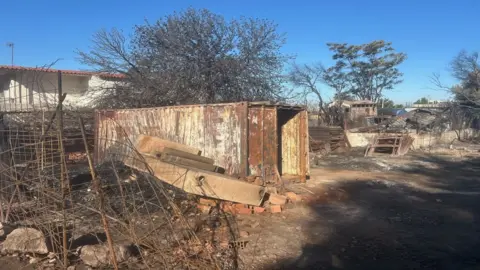
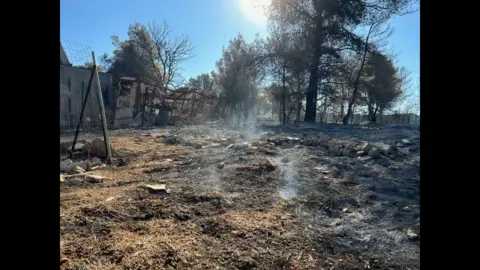
The Greek National Observatory said on Monday evening that satellite imagery showed that, as of noon local time (10:00 BST), the fire had affected about 100,000 acres (405 km2; 156 sq mi) of land.
In Penteli, a hilly area with many trees, Three hospitals had to be evacuated and one of the National Observatory sites was at some stage feared to be under threat.
The fire also destroyed a lumber mill, and elsewhere in the area several explosions were heard, likely from fuel tanks and residential gas cylinders.
Despite the danger, some Penteli residents chose to stay close to their homes and tried to extinguish the fire with fire hoses or tree branches.
“It’s painful. We grew up in the forest. We feel so sad and angry,” 24-year-old resident Marina Kalogerakou told Reuters as she poured water from a bucket on the burning tree stump.
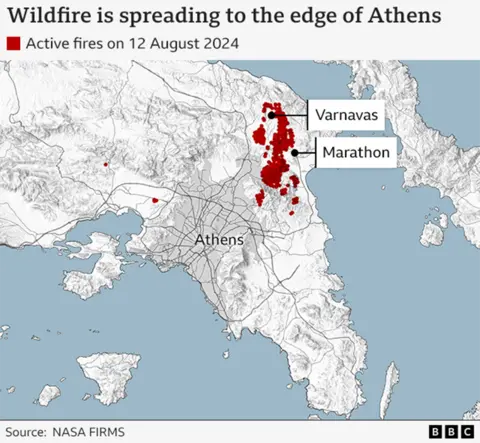
Pantelis Kyriazis, another resident, crashed his car while trying to leave.
“I couldn’t see anything. I hit a pine tree and this is what happened,” he said, pointing at the car.
Further north, near the epicenter of the fire, 81-year-old Vassilis Stroubelis stood in the doorway of his damaged home.
“It took me thirty years to build all this. Thirty years and boom,” he said.
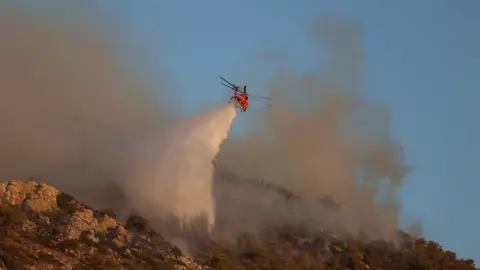 Reuters
ReutersEuropean countries have vowed to support Greece after its government triggered the EU’s mutual civil protection mechanism.
Italy will provide two aircraft while France and Serbia will each provide one helicopter, Colonel Vathrakogiannis said.
Spain, the Czech Republic and Romania are sending additional vehicles, personnel and aid.
Foreign Minister Öncü Keçeli said neighboring Turkey was also preparing to send two planes and a helicopter.
Writing on X, formerly Twitter, European Commission President Ursula von der Leyen said the EU would “stand side by side with Greece in the fight against the devastating fires”.
Greece just experienced its hottest June and July on record.
Climate change increases the risk of hot, dry weather that can easily cause wildfires.
The world has already warmed about 1.1 degrees Celsius since the industrial era began and temperatures will continue to rise unless governments around the world make drastic cuts to emissions.





